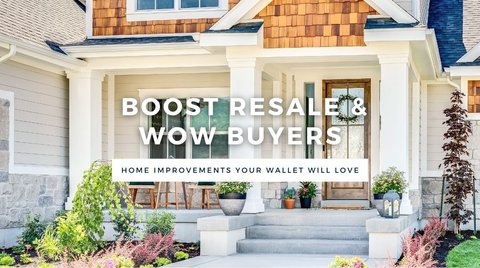Are Solar Panels Right for Your Boise Home?
Posted by Lisa Kohl on Thursday, August 26th, 2021 at 10:46am

If there’s one thing Boise has an abundance of, it’s sun. Our fair city gets an average of 210 sunny days per year, which is a boon if you love the great outdoors – or if you’re thinking of making the switch to solar power. Google’s Project Sunroof, which helps communities explore their solar potential, estimates that 86% of Boise’s rooftops are solar viable.
There are other great reasons more homeowners in the Treasure Valley are considering solar energy – it’s a green, renewable energy source that can save you money on your monthly power bill. But since residential solar is still fairly rare in Boise, we’re here to walk you through the other factors you should take into account before you start putting up panels – like local installation costs, when your system might pay for itself, and whether solar panels will increase the value of your home.
Solar Panels in Boise: The Short and Skinny
Chances are you’ve seen solar panels on homes before, but how exactly do they work? When activated by the sun, cells in the panels produce an electrical current that’s immediately used to power your home. The panels are good for about 25-30 years, at which point they probably need to be replaced (other components, like solar inverters, may need to be replaced sooner, like every 10-15 years).
The average Idaho household uses 1,010-kilowatt-hours (KWh) of energy per month; Project Sunroof estimates the median output for solar power in Boise to be 1,266 KWh every month. While that makes it seem like it’d be easy to get all your power needs met with solar, there are a few big caveats:
- Solar panels don’t work at night or on cloudy days – and generate less energy in the winter, due to weather and fewer daylight hours.
- The power your roof generates can’t be stored without investing in special batteries, which themselves cost between $5,000-$7,000.
- Some people have romantic notions about living “off the grid.” But unless you have a large solar system, keep your energy consumption low, and invest in batteries to capture extra current, you’ll still need to rely on a power company for some of your home’s needs.
That said, many power companies – including Idaho Power – offer “net metering” plans. This basically means that you’re credited for any excess solar power your home generates during the day that is added to the energy grid. You’re then able to use this “credit” when needed – at night, for example.
And regardless of how large your solar power system is, month to month you’ll save money on your energy bill.
Your Solar Panels May Take Decades To Pay for Themselves
In Idaho, the average cost of a 3kW solar panel system is $8,370, according to estimates from solar marketing firm EnergySage. A system this size produces about one-third of the energy an average Idaho home uses per month. On the other end of the spectrum, a 10kW system costs $27,900 – which could support all your energy needs, if you also invest in batteries (but again, that’s another $5,000-$7,000).
However, solar panels quotes can vary widely. Many factors influence the cost, including what type of roof you have, what shape it’s in, and how many panels you want installed.
So when can you expect your solar system to pay for itself? Thanks to Idaho’s abundance of cheap hydropower, it will take longer for you to break even on solar than in a high-cost energy state, like California. In fact, that’s part of the reason Idahoans have been slow to embrace solar – because it can take 15-25 years for a solar system to start saving you money. We know that’s a pretty big timeframe, but it's dependent on the factors mentioned above, as well as how you pay for it.
Like buying a home itself, investing in a solar energy system is cheapest if you can pay up front in cash. That said, many solar panel providers and some local lenders offer financing, and homeowners with excellent credit can get a home equity loan or a line of credit. One great option is the Idaho State Energy Loan program, which offers loans with an interest rate of 4%.
Incentives for Switching to Solar Energy in Idaho Are Great
If you want to make the switch, now is a great time to do it. Idaho’s Residential Alternative Tax Deduction allows homeowners to claim an income tax deduction of 40% of the cost of solar panel equipment and installation the year it’s installed. Homeowners can also deduct 20% of the cost for the next three years, with a maximum deduction of $5,000 per year or a total deduction of $20,000.
In addition, the federal residential solar energy tax credit lets homeowners claim a 26% tax credit on solar panels installed in 2021-2022 (and 22% for systems installed in 2023). Be aware, though: this tax credit is set to expire in 2024.
Solar Panels Won’t Increase the Value of Your Boise Home, Yet
The twenty-thousand-dollar question on your mind probably is: will solar panels increase the value of my Boise home? The short answer is no.
Unfortunately, homes in the Treasure Valley equipped with solar panels are still very rare. From a home appraiser’s standpoint, this means there aren’t enough comparable homes to give this feature a value, which means they won’t appraise your home higher when you’re looking to sell.
Buyers Generally Balk at Solar-Powered Homes
As the market currently stands, if you invest in a solar system and sell your home, don’t plan on making your money back. While there are a few Boise neighborhoods where buyers will embrace solar panels as part of their green lifestyle, and pay a (slight) premium for them, that’s generally the exception.
For many buyers, the thought of getting stuck with an aging solar system that needs replacing outweighs the potential benefits (much like a 90’s era above ground swimming pool). It actually detracts from the value of the house and what a buyer is willing to pay.
Another issue that we see crop up goes back to financing. Remember that 4% loan you took out to pay for your new solar system? The potential buyer now has to be willing and able to assume that monthly payment. And if they’re having trouble qualifying for a loan, there’s a good chance they won’t be able to take on this additional financial obligation. Nine times out of ten, the seller ends up having to pay off the remainder of their solar power loan at closing, using their proceeds from the sale.
But while the payoff for solar isn’t crystal clear today – at least from a real estate standpoint – that doesn’t mean it’s not worthwhile. It’s an investment in green energy, which more and more people are embracing. And the price of solar panels is only going to get cheaper; conversely, the cost of electricity will only get more expensive. While investing in solar panels for your home today might not make sense, it could very well be a smart choice a few years from now. Or if you’re building a custom home, a smart alternative could be to have it pre-wired for solar.
While there is plenty of evidence that solar panels add value to homes in other parts of the country. We aren’t quite there yet, but our time is likely coming.

Lisa Kohl
Lisa is a top Idaho Realtor and creator of WeKnowBoise.com. Whether buying or selling a home, we provide full-service real estate solutions dedicated to helping our clients achieve their goals. From Southeast Boise to the North End, up to Eagle and west to Meridian, or right in the middle of the Boise Bench and downtown - We Know Boise.





Leave A Comment